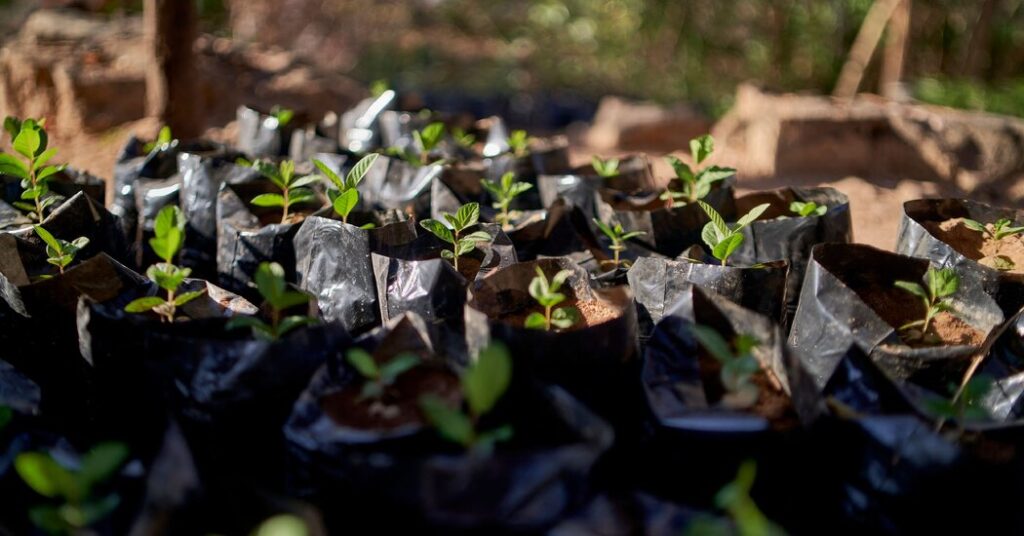The Biden administration on Tuesday laid out for the first time a broad set of government guidelines on the use of carbon offsets, seeking to boost confidence in an approach to combating global warming that is facing growing criticism.
Companies and individuals spent $1.7 billion last year on voluntary purchases of carbon offsets aimed at eliminating the climate impact of activities like air travel by funding other projects, such as tree planting, that remove carbon dioxide from the atmosphere, but that won’t happen if Without the extra money, none of this would happen.
However, a growing number of studies and reports are finding that many carbon offsets simply don’t work. Some offsets help finance wind or solar projects that might have been built anyway. And measuring the effectiveness of offsets designed to protect forests is often extremely difficult.
As a result, some scientists and researchers believe carbon offsets are irredeemably flawed and should be abandoned entirely. Instead, they say companies should focus on directly reducing their own emissions.
The Biden administration is now weighing in on that debate, saying that with the right protections in place, offsets can sometimes be an important tool in helping businesses and others reduce emissions. New federal guidance seeks to define “high integrity” offsets as those that achieve real and quantifiable emissions reductions that would not otherwise occur.
“Voluntary carbon markets can help unleash the power of private markets to reduce emissions, but this can only happen if we address the significant existing challenges,” Treasury Secretary Janet Yellen said in a statement. She is scheduled to discuss the guidance with other administration officials at an event in Washington on Tuesday.
“The principles released today are an important step towards establishing a voluntary carbon market with high integrity,” she said.
New federal guidance also urges companies to first focus on reducing emissions within their own supply chains as much as possible before purchasing carbon offsets. Some companies complain that it is too difficult to control their vast networks of external suppliers and that they should be allowed to use carbon offsets to address pollution problems related to the cement or steel they use, for example.
While the new federal guidelines are neither binding nor enforceable, proponents of voluntary carbon markets say they can help foster a larger market for high-quality offsets that are truly effective. There are also private organizations, such as the Voluntary Carbon Market Integrity Commission, that are working to develop principles for effective carbon offsets.
“There are reliable estimates that voluntary carbon markets could grow to 10 to 20 times what they are now, and then you’re talking about real money to fight climate change,” said Nat Keohane, president of the Center for Climate and Energy Solutions, a group that supports the use of carbon offsets. Environmental organizations. “But we’re not going to get to this scale unless buyers have confidence in what they’re buying.”
Critics of carbon offsets, however, say the new federal guidelines are too vague to describe what constitutes a high-quality project. What’s more, critics say that if governments don’t impose stricter enforcement on the voluntary carbon market, there will still be a large number of cheap, ineffective carbon offsets that companies can continue to buy without any consequences.
“If the government doesn’t take steps to address the bottom of the market through enforcement, I don’t think any low-quality credit is going to go away,” said Danny Callenward, a senior fellow at UK University’s Clayman Center for Energy Policy.
In California, some lawmakers have introduced a bill that would penalize companies that sell offsets that are unlikely to be “quantifiable” or “real.” But the bill faces opposition from business groups and even some environmentalists, who say it could cut off funding for protecting forests and other natural lands.
Biden administration officials say offsets could also help direct investment to poorer countries struggling to raise funds to combat climate change. Although President Biden has pledged more than $11 billion in annual climate aid to developing countries, Congress has approved only a fraction of that.
To combat climate change, “we need to mobilize a lot of private capital,” said John Podesta, Biden’s senior adviser for international climate policy. Voluntary carbon markets could “support clean energy deployment in developing countries, which stand to benefit most from new investment,” he said.

